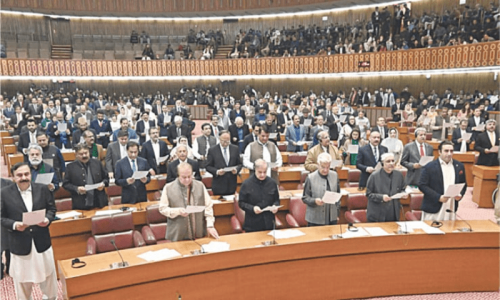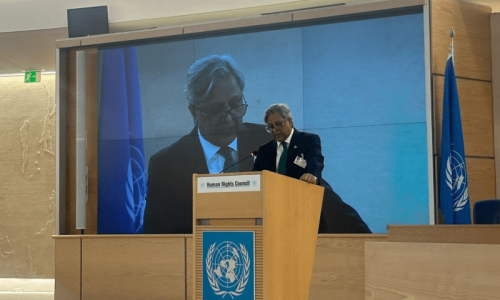Landi Kotal Ki Laaltain
By Sajjad Azhar
Misaal
In the blurb he writes for Sajjad Azhar’s new book of prose poetry, Landi Kotal Ki Laaltain [The Lanterns of Landi Kotal], poet Iftikhar Arif is very appreciative. According to Arif, the reason he likes the poems so much is because of how Azhar’s verses converse and raise questions about the unevenness and meaninglessness of life.
Azhar is a journalist by profession. Although educated in the United Kingdom and now living in the United States, he has not severed his relationship with his motherland. He keeps a vigilant eye on the happenings in his native country but, with the passage of time, has come to realise that the world is not what our eyes see.
The first poem, ‘Bayaaniyah’, can be translated as ‘Narrative’. It deals with the plight of those who live in a desert, yet the search for water is considered a crime there. This is a story of children who, despite battling starvation, somehow find the courage to defeat the invaders trying to steal their land and emerge from the combat scarred and wounded, yet victorious and free.
The titular poem has Azhar relating his own experiences of searching for a job. Degrees in hand, he wandered in vain, and it was in pursuit of these very degrees that he spent countless hours reading by the light of a lantern. Although his sight has mercifully remained unaffected, his sense of smell has been impaired. Breathing in the acrid fumes rising from the oil burning in the lantern also altered his thinking process for the worse.
The Landi Kotal Azhar writes about is a town in Khyber Pakhtunkhwa. Once upon a time, it was a place to buy lanterns made in Germany. Today, one goes there to shop for smuggled American guns. Young men from religious seminaries, who have been taught to handle these weapons, can often be seen browsing the wares.
This transformation is but a natural sequence of events: when fear of uncertainty prevails, illuminating light is replaced with guns and, instead of fresh air, the atmosphere is heavy with the smoke from scorched gunpowder.
Most of Azhar’s poems deal with the turmoil faced by people in modern times, as we move away from love and towards war, destruction and delusions. ‘Mohabbat Ki Devi’ [The Goddess of Love] describes man’s sense of supremacy and how it has belittled the love that was once being spread by female deities.
Man in his arrogance took control of the goddesses; they exist now merely to please his senses. Love in its purest sense has been forced to flee:
[And after that
The sound of jingles can be heard from the temple
But no sound of love is audible]
‘Azadi’ [Freedom] is a beautiful explanation of the concept. We all need the same basic necessities, but our biases do not allow us to live in peace. We turn to ashes because of the flames of hatred blazing in our hearts. This fire is ignited by those who deal in firearms, making everyone their slave.
‘Fault Lines’ questions God, who is just and all-powerful, yet His world is full of schism. Azhar writes that the world is engaged in a constant search for Abraham, but whenever one is found, the world throws him into the fire.
‘Junoon’ [Passion] describes the past, and how Moses, Jesus and the Messenger of Islam changed the world for the better. It shows how the human being of this century realises the fact that the prophets have been long forgotten and everywhere, whether Gaza, Syria, Afghanistan or Kashmir, the mad passion for bloodshed, jealousy and lust is rampant.
Other subjects Azhar tackles are missing persons, the natural environment, the incident of Karbala and even science. His wordplay is deft and he observes, deciphers and writes with compassion.
His grasp of current affairs results in a poem such as ‘Talk Show’, which broadcasts a clear and precise picture of what most of us view on television today:
[Now the villages do not have such sheds
As the villagers
Enjoy more than the dog shows
The fight among humans on television]
Poet Harris Khalique rightly points out that Azhar’s verses prompt us to view the inner depths as well as looking at the far and wide. Poems such as ‘We Are in Quarantine’ tell us that humans are in isolation not because of some virus, but because of the torture they’ve endured in the past, and which they will continue to endure in the future.
The economic constraints imposed by the ‘One Percent’ upon the 99 percent has resulted in turmoil that began a long time ago, and shows no signs of stopping. Azhar exhorts readers to understand that, without drastic change, we are doomed. Humanity’s downfall will come about not because there isn’t enough water, or because there’s too much pollution, but because of our immense selfishness.
Yes, the cloud of pessimism hangs dark in these beautifully composed verses but, as Azhar rightfully asks, what is there to look forward to? Describing the fires that raged through Australia in recent years — and, according to news reports, killed, harmed or displaced almost three billion (yes, billion) koalas, kangaroos, reptiles and other species — he writes:
[On the third side of the First World
Is Kashmir, Palestine and Afghanistan
Where millions of people are killed
…
But maybe the First World understands the language of animals
So let us
All become animals]
We can only hope that, since Azhar’s book will be read by humans and not animals, we pay attention to all that we’re doing wrong and change our ways before it’s too late to save us.
The reviewer teaches English literature
Published in Dawn, Books & Authors, July 17th, 2022


















































